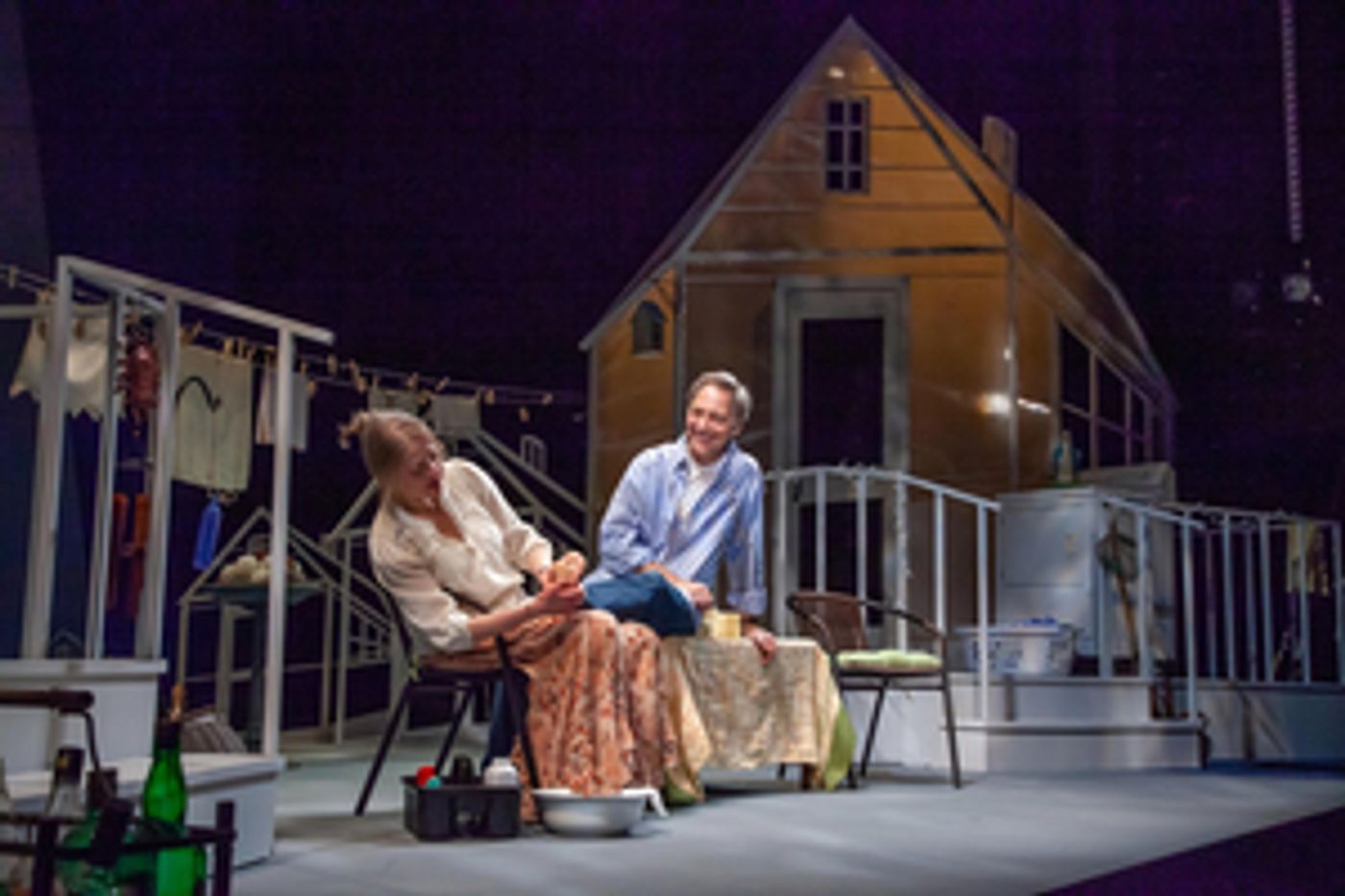Review: MAYTAG VIRGIN: Folding Laundry, Mending Hearts at Merrimack Rep

Maytag Virgin
Written by Audrey Cefaly, Directed by Eleanor Holdridge; Scenic Designer, Kris Stone; Costume Designer, Charlene Alexis Gross; Lighting Designer, Karen Perlow; Sound Designer, Scott Stauffer; Production Stage Manager, Becca Freifeld; Producer, Peter Crewe
CAST: David Adkins, Kati Brazda
Performances through February 2 at Merrimack Repertory Theatre, 50 East Merrimack Street, Lowell, MA; Box Office 978-654-4678 or www.mrt.org
Maytag Virgin is a two hour, two-character play performed on a unit set with no changes of scenery. It contains no violence, no sex, and no rock and roll. There is one scene where the guy removes his shirt and is bare-chested for about a minute, and the woman appears in her nightgown, but it is of the granny-gown, flannel variety. If that all sounds as exciting to you as a Saturday night doing laundry, let me assure you that there's much more involved here than wash, dry, and fold. Southern playwright Audrey Cefaly has crafted a sweet, accessible story with a pair of characters who could live next door, and we'd all be better for having neighbors like them.
Set in the present day in a fictional town in Alabama, Maytag Virgin is a slice of life, character-driven romantic comedy about two forty-something school teachers, both widowed, who meet cute in their connecting yards when Jack (David Adkins) moves in adjacent to Lizzy (Kati Brazda). Unfazed by the knowledge that the previous owner of his house died there, Jack does seem a little spooked when Lizzy lets him know that the death occurred in what he is using as the master bedroom. His solution is to bed down on a cot on his porch, right next to the Maytag dryer he keeps out there, much to Lizzy's consternation. (We learn that, among her myriad of trust issues, she doesn't trust clothes dryers.)
Good fences make good neighbors and their lack of one leads to many challenges. She is a neurotic, loose cannon, while he is laid back and plays his cards close to the vest. However, they are both warm people with good (albeit broken) hearts who keep looking for a way to bond. Lizzy's husband died suddenly a month before the story starts, while Jack lost his wife two years prior. Even as they butt heads over their differences and their diverse world views, they begin to see the things that connect them once they lower their defenses. The exposition in the first act mirrors the getting to know you phase of a relationship and culminates in a shared, emotionally-charged moment, accompanied by a booming thunder clap, a flash of lightning, and a cleansing downpour.
There is a palpable change in the air when act two begins. Three months have passed, it is the end of summer, and it feels as if each of the characters has moved ahead a few squares on the game board of life. Director Eleanor Holdridge quickens the pace of play, but Jack and Lizzy realize they are both rusty when it comes to the rules of engagement. Some old letters they find from the couple who used to live in Jack's house provide them with insight and help guide them toward the answers they seek. It remains to be seen if or how they'll wind up at the same destination, but their parallel journeys seem destined to converge and Cefaly makes us root for that outcome.
While credit is due to the unpretentiousness and flow of the playwright's words on the page and the nature of the characters she developed, Adkins and Brazda are the living, breathing personification of Jack and Lizzy, infusing them with all of the goodness, quirks, insecurities, loneliness, and love that Cefaly imagined them to have. These seasoned actors each create an indelible impression of their character as an individual, and then merge those impressions into a pair whose whole is greater than the sum of its parts. Adkins has previously appeared in IRNE-nominated productions at Merrimack Repertory Theatre and has a lengthy resumé, including his work at Berkshire Theatre Group. Brazda is making her MRT debut, but has a volume of credits ranging from New York to countless regional theaters.
We are further drawn into the world of the play and the lives of the characters by the work of the designers. Kris Stone's set consists of a pair of matching houses with evocative screen doors and porches, their darkened windows concealing their inner secrets. Upstage, strung between the two buildings, Lizzy's clothesline is a focal point, standing out in Karen Perlow's lighting scheme. Charlene Alexis Gross costumes Jack in jeans and collared shirts, and gives Lizzy a bohemian wardrobe to match her sensibility. Sound designer Scott Stauffer provides folksy music between scenes, and really makes an impact with the sounds of the storm at the end of act one.
Maytag Virgin looks at the difficulties people have in connecting, especially when they're not sure if they're ready. It is so much easier to stay home and do laundry than to put yourself out there, especially for those of a certain age. One of the things that sets this play apart is the fact that Jack and Lizzy aren't kids, that they've experienced life and have been disappointed by it. However, it is that fact that gives them the courage and the desire to go for it one more time. When the dryer buzzes at the end of the cycle, it is the signal they've been awaiting.
Photo credit: Meghan Moore (Kati Brazda, David Adkins)
Reader Reviews
Videos

